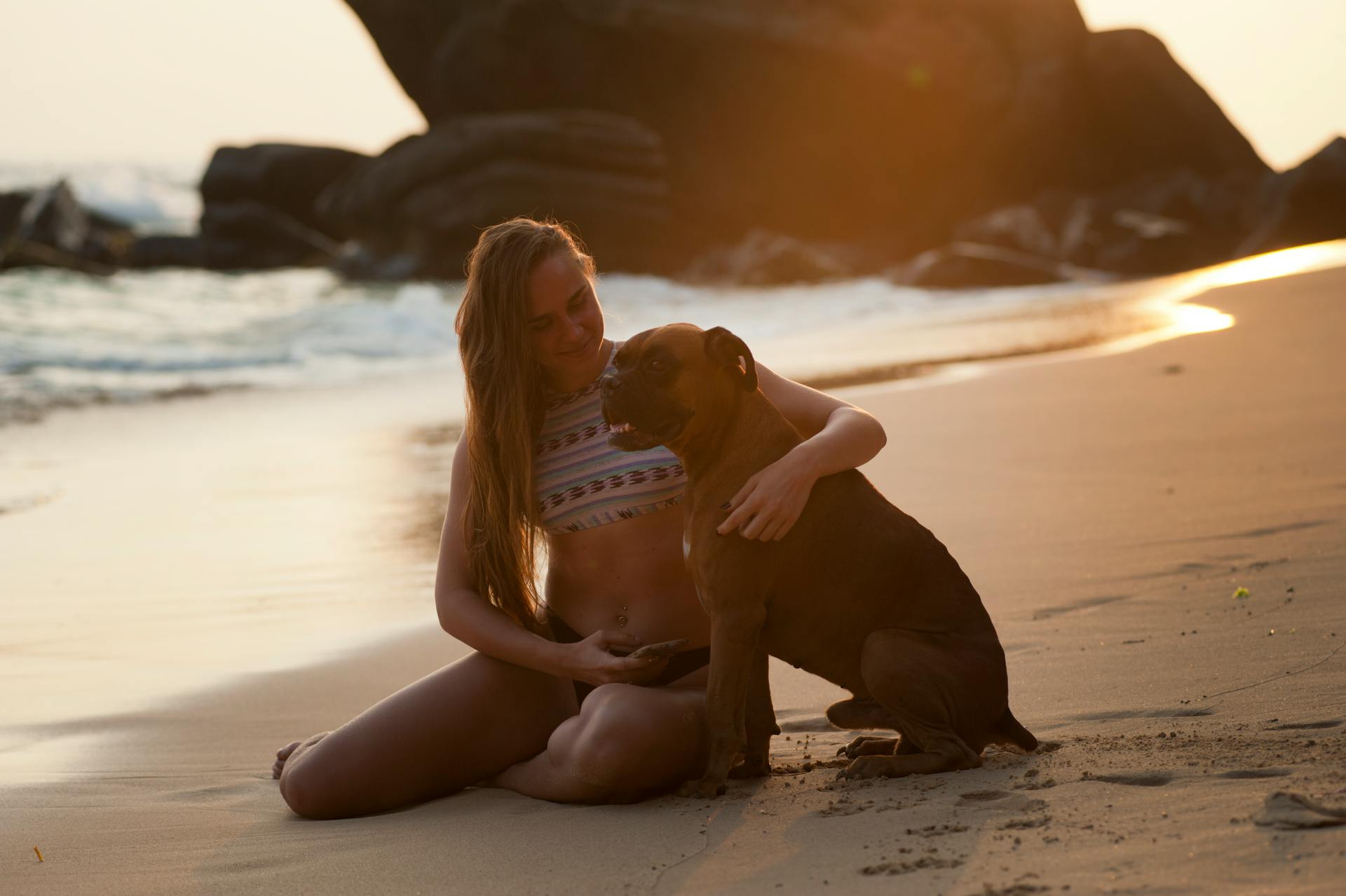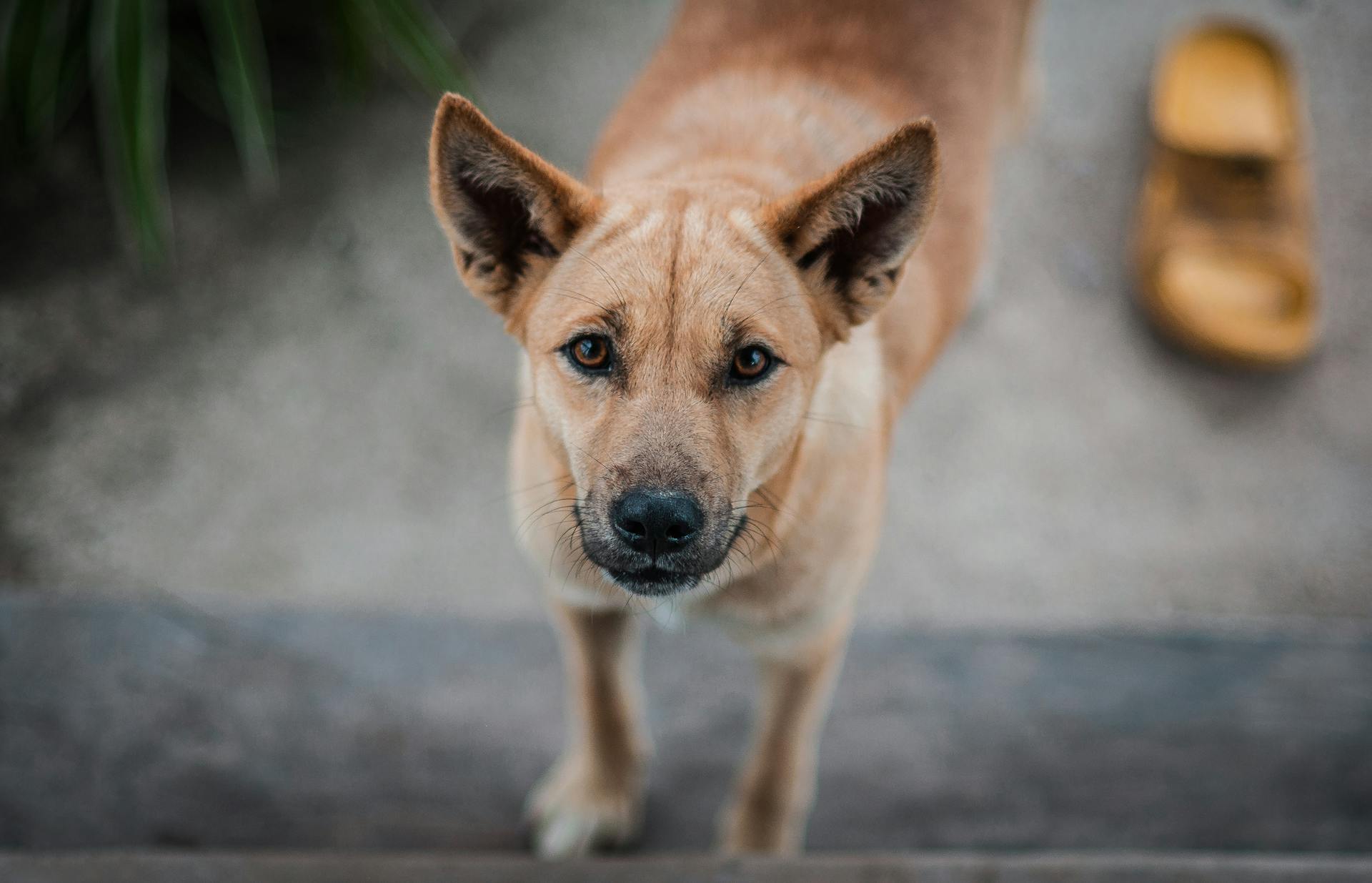
Bull Boxer puppies are a cross between an American Bulldog and a Boxer, and they make fantastic family pets. They're energetic, playful, and loving, which is why they're a popular choice for many families.
Bull Boxer puppies are generally considered to be medium-sized dogs, weighing between 60-80 pounds and standing between 20-25 inches tall at the shoulder. They have a short, easy-to-maintain coat that comes in a variety of colors, including fawn, brindle, and white.
To ensure your Bull Boxer puppy grows into a happy and healthy adult, it's essential to provide them with regular exercise and mental stimulation. A daily walk and playtime should be a must for these energetic pups.
Temperament & Intelligence
Bullboxer puppies are known to be friendly and social, making them a great addition to families with children. They love to run and play, and their high energy levels require regular exercise.
Their intelligence is one of their best qualities, as they are eager to please their owners and can learn quickly with consistent training. However, they can be stubborn at times, so a firm hand is necessary when teaching them new things.
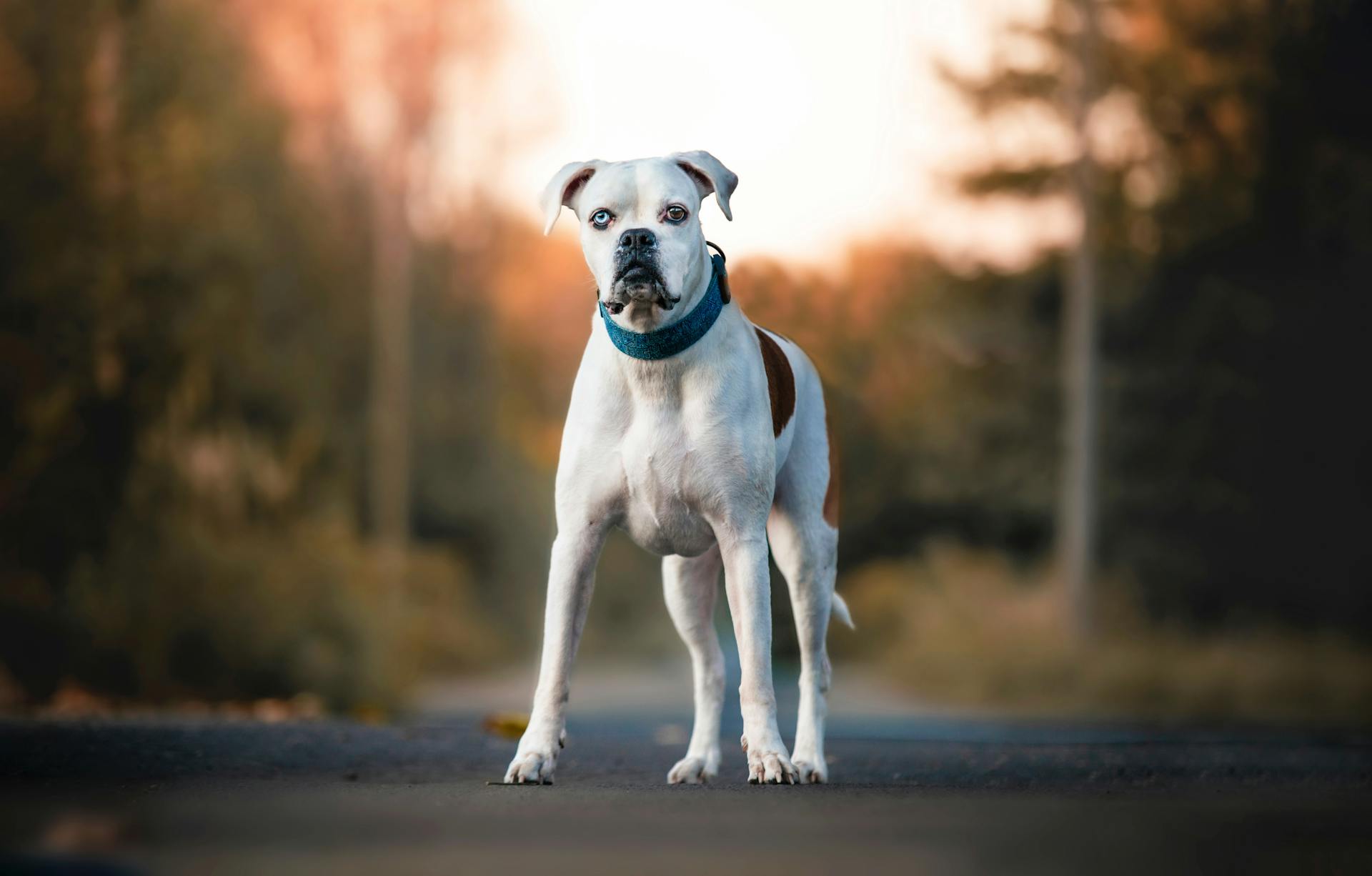
Bullboxer puppies don't like to be left alone for long periods of time, so they thrive in households where they are part of the family and receive plenty of attention. They are also intelligent enough to want to please their owners, which makes training a rewarding experience for both parties.
As working dogs, Bullboxer puppies need to be kept busy with toys and activities to prevent boredom and destructive behavior. They are also strong and muscular, so training is essential to channel their energy into positive outlets.
Their loyal nature makes them devoted to their families, and they can become protective of children in the household. However, this loyalty requires responsible ownership, including early socialization and ongoing training.
With proper care and attention, Bullboxer puppies can grow into well-behaved and loving companions that bring joy to their families.
Here's an interesting read: Training Boxer Puppies
Health Considerations
As a responsible dog owner, it's essential to be aware of the potential health issues that can affect your Bull Boxer puppy. Hip dysplasia, a common health problem in many breeds, is something to watch out for in your Bull Boxer.
Bull Boxers are generally considered to be a healthy breed, but they can inherit some conditions from their parents, such as heart disease and brain tumors, which can lead to serious health issues if left untreated.
Regular veterinary checkups are crucial to ensure your Bull Boxer stays healthy. Your vet can keep an eye out for potential health problems and perform tests if they suspect any of the serious conditions.
Some minor conditions that your Bull Boxer might inherit from their parents include a twisted spleen, corneal disease, and hypothyroidism. Skin allergies can also become a problem, so keep an eye out for any signs of irritation or discomfort.
Here are some common health issues to watch out for in your Bull Boxer:
- Hip dysplasia
- Cancers (such as heart disease and brain tumors)
- Minor conditions (such as twisted spleen, corneal disease, and hypothyroidism)
- Skin allergies
By being aware of these potential health issues and scheduling regular veterinary checkups, you can help ensure your Bull Boxer lives a long and healthy life.
Coat and Grooming
The Bull Boxer's coat is a joy to work with, and with the right care, it'll stay healthy and shiny. Brushing a couple of times a month will keep it looking great.
They have a thin coat, which means they don't shed much unless it's a seasonal change. This makes grooming a breeze, especially since they have short hair.
You'll want to brush your Bull Boxer once a week to keep them looking their best. This will also help reduce shedding throughout the year.
Their floppy ears need regular cleaning to prevent wax and oil buildup. You can brush their teeth and trim their nails when they're young to make it a habit for them.
Bathing your Bull Boxer once a month is usually enough, unless they get into something messy. Just be sure to use high-quality shampoo to keep their coat healthy.
If your Bull Boxer inherits the distinctive facial wrinkles from their Boxer parent, you'll want to wipe their face down once a week to prevent skin irritation.
Care and Maintenance
Regular veterinary checkups are essential to detect any health concerns early in your Bullboxer Pit.
Monitor your Bullboxer Pit's food servings closely to prevent overeating, which can lead to obesity. Aim for a couple of hours of exercise every day, including brisk walks, frisbee, swimming, and agility training.
To prevent paw pad cracking and drying, use a recommended moisturizer on your Bullboxer Pit's paws.
Bulloxers are relatively low-maintenance when it comes to coat care, shedding lightly and requiring minimal brushing.
Daily tooth brushing is crucial to keep your dog's teeth and gums healthy. If daily brushing isn't possible, aim for two or three times a week.
Breed Maintenance
Regular veterinary checkups are crucial to detect any health concerns early, and your vet can help you develop a care routine that will keep your dog healthy.
Bullboxer Pits, in particular, are prone to obesity due to overeating, so monitoring food servings and preventing over-snacking is essential.
A couple of hours of exercise every day is recommended for Bullboxer Pits, which can include brisk walks, frisbee sessions, swimming, and agility training.
Proper dental care is also vital, and brushing your dog's teeth every day is ideal, but brushing two or three times a week is a good alternative.
Checking your dog's nails once or twice a month is necessary to prevent clicking noises as they walk, and trimming them if needed.
Ear infections can occur in any dog, so wiping out your pet's ears every week and checking for any abnormalities is a good habit to get into.
Discover more: Bull and Terrier
Things to Know When Owning a Pet
Owning a Bull Boxer will take time, money, and patience to make sure your dog is trained, socialized, healthy, and happy. This breed requires regular exercise, so be prepared to dedicate at least 30 minutes a day to physical activity.
Bull Boxers have a high prey drive, which means they may react to small animals running, so it's essential to socialize and train them when they're puppies. This can help prevent unwanted behavior later on.
As a large dog, Bull Boxers need regular grooming to prevent skin problems and keep their coat clean. A daily brushing routine can help prevent matting and tangling.
Bull Boxers are intelligent and powerful dogs, making them great guard dogs, but also requiring consistent training and socialization to ensure they get along with other pets and people. With patience and practice, you can develop a strong bond with your Bull Boxer.
Family and Pet Compatibility
Bull Boxers are excellent for families, especially ones who are active.
They love spending time with kids, but it's essential to supervise them around very small children.
Bull Boxers are very loving and loyal to their families, but they can be protective regarding their families.
They require regular exercise and mental stimulation to prevent boredom and destructive behavior.
With proper care and attention, Bull Boxers can thrive as beloved family pets.
Size and Feeding
The Bullboxer Pit is a sturdy breed, weighing in at 50 to 80 pounds and ranging in height from 16 to 20 inches.
Female Bullboxer Pits are often a little smaller than their male counterparts.
A regular feeding schedule is essential to prevent overeating, as Bullboxer Pits have a tendency to overindulge if left unchecked.
Size
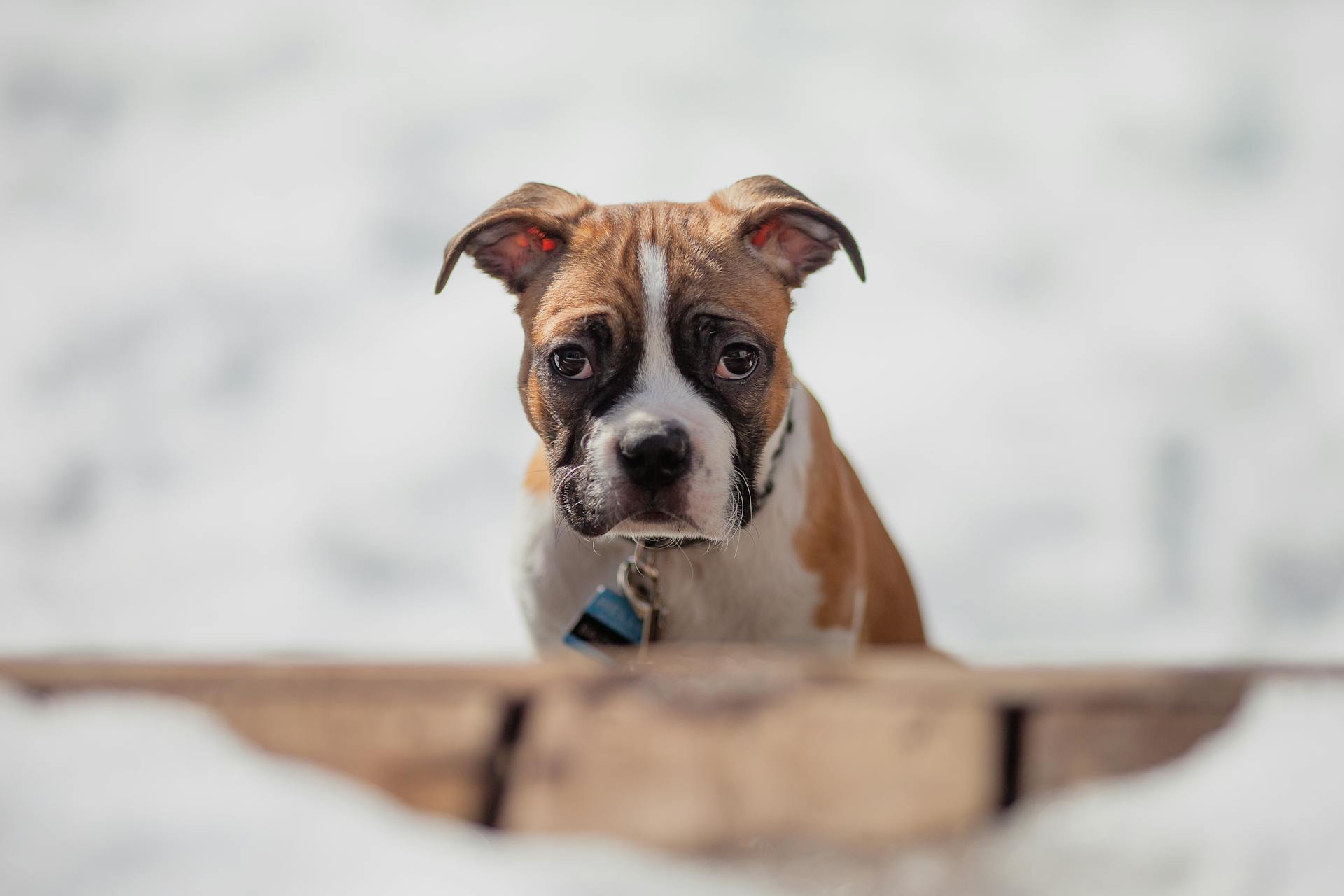
The Bullboxer Pit is a medium-sized dog, but they're stockier and sturdier than many other middle-sized canines.
Most Bullboxer Pits weigh in at 50 to 80 pounds.
They range in height from 16 to 20 inches.
Female Bullboxer Pits can often be a little smaller than their male counterparts.
Bull Feeding
A Bullboxer Pit's diet should be formulated for a medium-sized breed with medium-to-high energy.
To avoid overeating, it's essential to stick to a regular feeding schedule and keep snacks to a minimum, especially if your Bullboxer Pit hasn't been trained correctly.
Their dietary needs will change from puppyhood to adulthood and continue to change into their senior years, so it's best to ask your veterinarian for recommendations.
This breed fares best in moderate climates, so try to avoid extreme temperatures if possible.
Readers also liked: Boxer Puppies Breed Info
Health and Wellness
Bull Boxer puppies are generally considered to be healthy dogs, but like any breed, they can be prone to certain health issues.
Hip dysplasia is a common health problem that can affect Bull Boxers, causing arthritis and mobility issues later in life. Regular exercise and a balanced diet can help prevent this condition.
Bull Boxers can also be susceptible to skin allergies, which can cause itching, scratching, and skin irritation. Keep an eye out for signs of skin allergies and consult your vet if you notice any issues.
In addition to hip dysplasia and skin allergies, Bull Boxers can also inherit conditions such as hypothyroidism, colitis, and corneal disease from their parents. These conditions can be managed with proper veterinary care and treatment.
Here are some common health issues to watch out for in Bull Boxer puppies:
- Hip dysplasia
- Corneal disease
- Hypothyroidism
- Colitis
- Skin allergies
By being aware of these potential health issues, you can take steps to prevent or manage them, ensuring your Bull Boxer puppy lives a happy and healthy life.
General Information
Bull Boxer puppies are a cross between a Bulldog and a Boxer, making them a unique and lovable breed. They can grow up to 20 inches in height and weigh between 50-70 pounds.
Their short coats require minimal grooming, but they do need regular exercise to stay happy and healthy. A daily walk and some playtime should do the trick.
Bull Boxer puppies are known for their friendly and outgoing personalities, making them great family pets.
Bull History
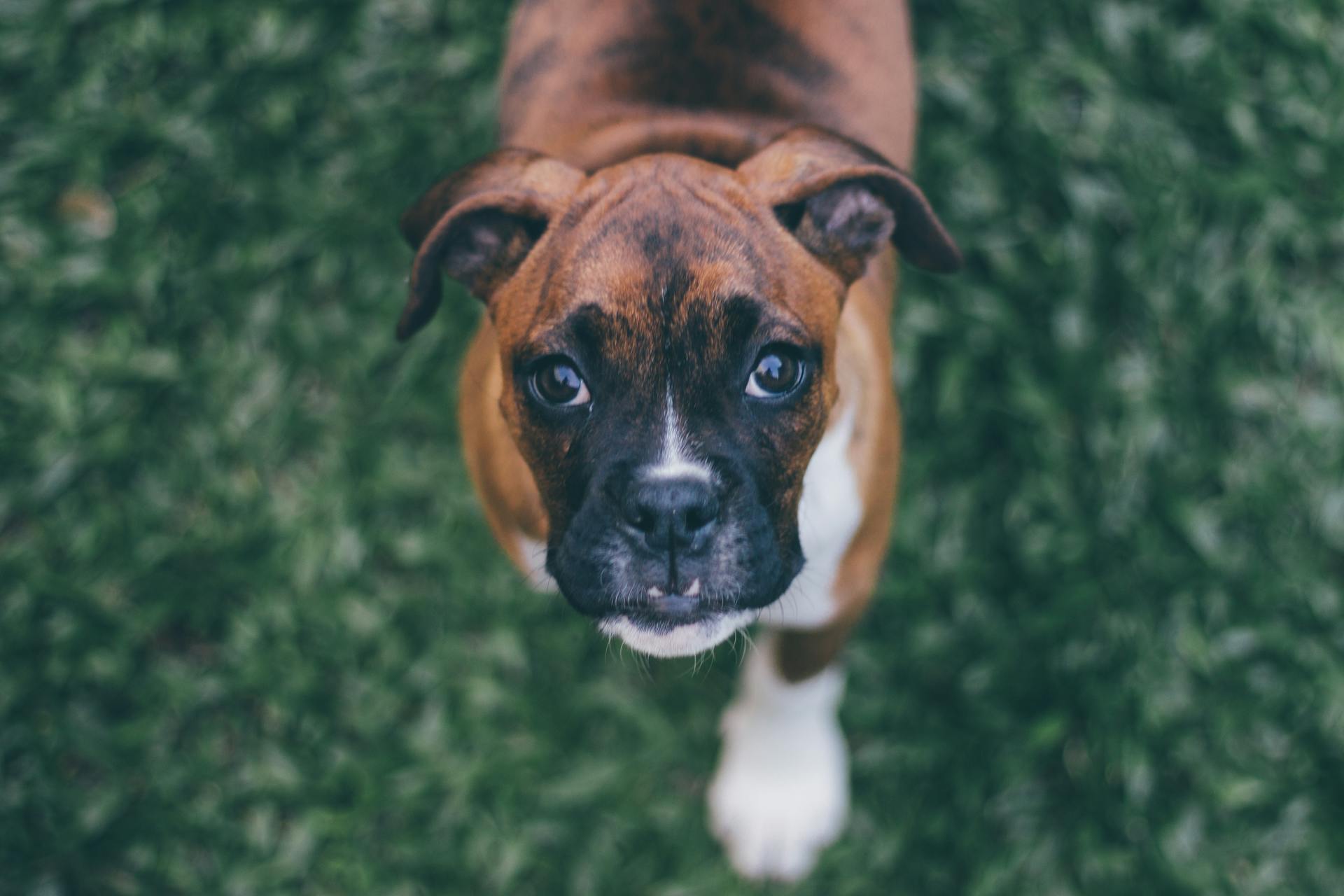
The Bullboxer Pit's parent breeds have a rich history. Boxers originated in Germany in the 1800s and were used to transport supplies and ferry messages to troops during the first two World Wars.
The American Pit Bull Terrier was first employed in blood sports and used in baiting bears and bulls. This history is a significant part of the breed's development.
The Bullboxer Pit's ancestry can be traced back to the Bullenbeisser, a German dog breed that is now extinct.
Highlights
The Bullboxer Pit is a mixed breed dog, which means it's not a purebred like its Boxer and American Pit Bull Terrier parents. This unique heritage makes every Bullboxer Pit a one-of-a-kind companion.
One thing to keep in mind is that Bullboxer Pits may tend to overeat, so it's essential to monitor their diet closely to prevent weight gain. This requires diligence from their owners.
Bullboxer Pits are often used as farm or guard dogs due to their loyal nature and powerful strength. They're naturally protective of their family and territory.
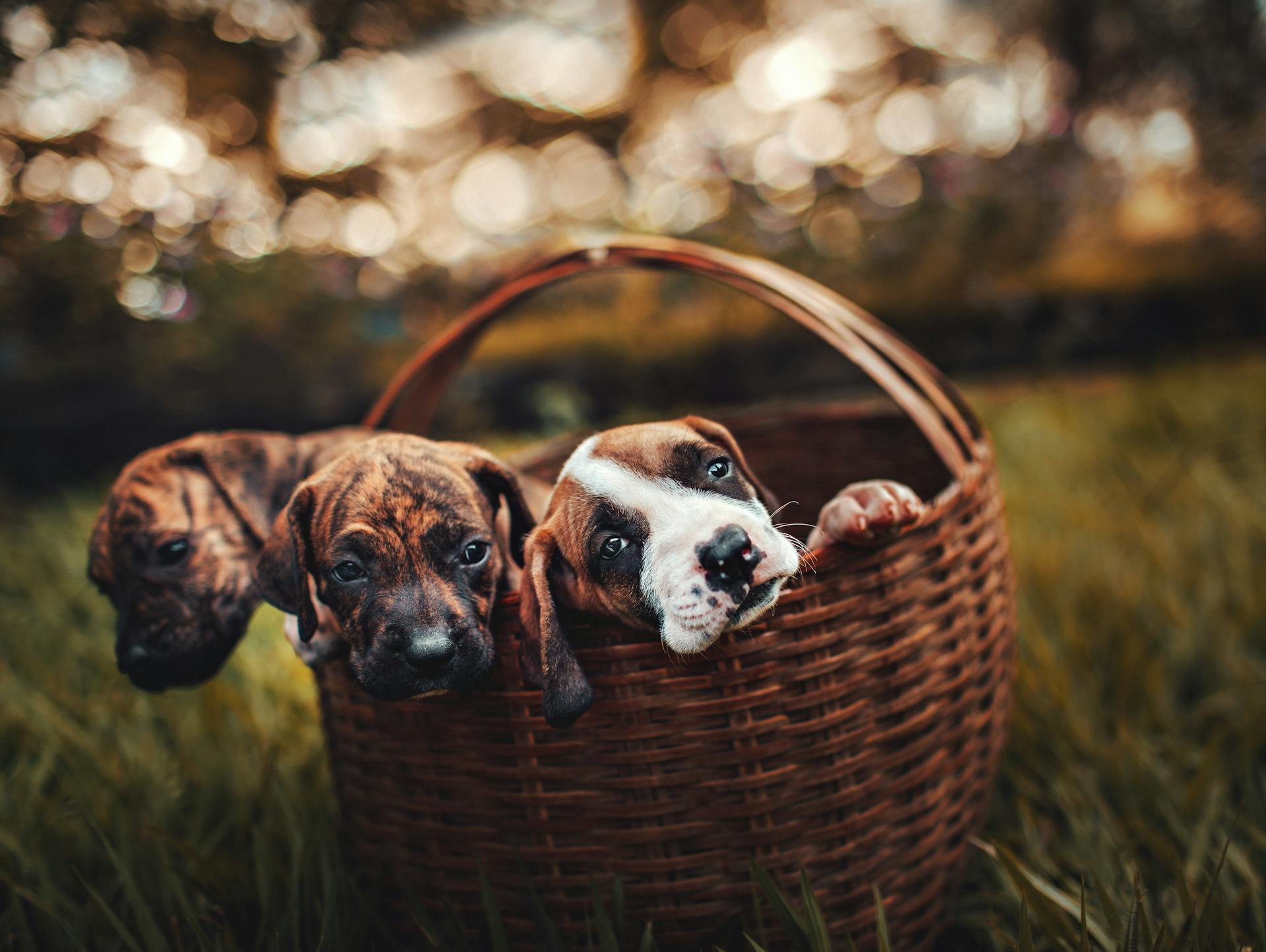
Their protective instincts also earn them the nickname "nanny dogs", as they're particularly devoted to children. This makes them a great choice for families with kids.
The Bullboxer Pit's coat comes in a wide range of colors, including brown, tan, yellow, and black. They're relatively low-maintenance when it comes to grooming, but they do shed all year round.
To keep their coat looking its best, regular brushing can help reduce shedding. This is especially important for owners who want to minimize the amount of dog hair in their home.
If you're considering bringing a Bullboxer Pit into your family, be aware that they require regular exercise and training. They're not a good fit for novice dog owners, as they need consistent guidance and attention.
Here are some key characteristics of the Bullboxer Pit breed:
- Coat colors: brown, tan, yellow, black, and many others
- Shedding: all year round
- Dietary needs: monitor food intake to prevent overeating
- Exercise needs: regular physical activity required
- Training needs: consistent guidance and attention necessary
Activity and Requirements
Bull Boxer puppies are talented athletes that need a moderate amount of exercise to stay in shape.
They require between 30 and 45 minutes of exercise per day to keep them happy and healthy, and prevent boredom and mischief.
Getting enough exercise is crucial, as a bored Bull Boxer can quickly turn into a destructive one.
A minimum of 2 hours of activity daily is essential, whether it's walking, playing fetch, or running alongside you.
This will help get rid of excess energy, keep them in good shape, and prevent boredom.
Frequently Asked Questions
How much do bull Boxers cost?
Prices for high-quality Bull Boxer puppies can range from $1,500 to over $5,000, depending on their pedigree and physical traits. If you're interested in learning more about the costs and characteristics of Bull Boxers, keep reading.
Are Bullboxer good dogs?
Bullboxers make great companions, being loving, affectionate, and fun to be around. They are a moderate to high energy breed that thrive on interaction with their owners.
How big does a bullboxer get?
A Bullboxer typically grows to be 16-20 inches tall and weighs between 50-80 pounds.
Featured Images: pexels.com
